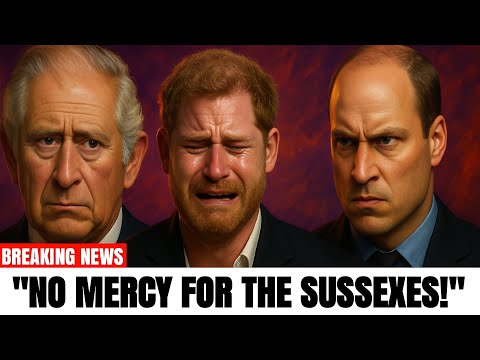WAR IN THE PALACE: William and Charles Explode Over Sussex Punishment

They buried the truth for years until Prince William’s secret letter shattered the silence. A royal war has erupted behind palace walls. In a leaked letter—no one was ever meant to see—Prince William allegedly demanded that Harry’s children, Archie and Lilibet, be stripped from the royal line of succession unless a DNA test could prove their legitimacy.
But here’s the shocker: King Charles refused. Why did Charles ignore his eldest son’s urgent plea? What does this say about the deep fracture between the monarch and his heir? And could this explosive memo be the final nail in the Sussex’s royal status? Stay with us because what we uncovered next will leave you stunned.
Before we continue, please hit the like button, subscribe to the channel, and turn on the notification bell for updates. No rightful claim, no rightful place. Those seven words reportedly scrolled in a confidential royal letter have exploded into a full-blown constitutional crisis.
This is not a story about mere family drama. This is a story about legacy, legitimacy, and the shattering of a centuries-old foundation that holds together the House of Windsor. It began with what seemed like a private dispute. One brother walked away from the monarchy, hoping to escape its suffocating rules. The other stayed behind, carrying the weight of destiny and duty.
For years, tension brewed behind polished smiles and carefully managed public appearances. But now, the mask is dropped. A leaked letter allegedly written by Prince William to King Charles has ripped open wounds that have festered for years. In it, William demands that the children of Prince Harry and Meghan Markle—Archie Harrison and Lilibet Diana—be formally removed from the line of succession unless irrefutable DNA proof of royal blood is provided.
And even more shocking: King Charles, despite knowing the contents of the letter, never replied. This silence is not just deafening—it’s dangerous. The monarchy is a structure built not only on bloodlines and ceremony but also on trust. And right now, that trust is eroding fast.
What happens when a future king challenges the very legitimacy of his own blood relatives? What happens when the current monarch refuses to take a stand? What does it mean for the next generation of royals—especially when the foundation of their titles, their rights, and their futures are being publicly questioned by their own family?
This is more than a feud. This is a silent war. The palace had hoped to contain it. Their response: silence, distraction, delay. But in the age of leaks and viral outrage, secrecy no longer works. The public has caught wind of a royal rupture that cuts deeper than anything seen since the abdication crisis of 1936. And this time, it’s not about love defying duty. It’s about power, inheritance, and whether the crown can survive a battle that is tearing it apart from within.
Let’s step back and understand how we got here. The conflict between Prince William and Prince Harry has been well documented over the years. Some say it began long before Meghan Markle entered the picture. As children, the two princes leaned heavily on one another following the tragic death of their mother, Princess Diana. They were united by grief, bonded by the crushing expectations of royal life.
But as time passed, the pressure mounted. One brother was always destined to rule; the other was expected to support. That dynamic grew more complicated with age. William followed the path laid out for him: military service, public duty, and a carefully selected spouse—Catherine Middleton, a woman from a respectable background with an image the monarchy could proudly promote. Harry, by contrast, became the wild card. Tabloid scandals, partying, and romantic entanglements plagued his younger years.
But when Meghan entered the scene, everything changed. Harry found purpose. He found protection. But the institution saw a threat. To many within the palace, Meghan was not just an outsider; she was unpredictable, vocal, and unwilling to play the game. From the start, whispers began circulating amongst senior courtiers. Was she truly prepared for royal life? Did she understand the rules, or was she intent on rewriting them?
By the time the Sussexes announced their departure from royal duties in early 2020—a move dubbed “Megxit” by the press—the damage had been done. Behind closed doors, William was said to be livid, not just because his brother had left but because of how he left: abruptly, without warning, and with a tone that accused the institution of racism, cruelty, and betrayal. In private, William reportedly called the move a betrayal—not just of the monarchy but of their late mother’s legacy.
But what transformed this private bitterness into a full-scale conflict was not Megxit. It was what came after. In March 2021, Harry and Meghan sat down with Oprah Winfrey for an interview that rocked the monarchy to its core. Meghan claimed that before Archie’s birth, there had been concerns and conversations within the royal family about how dark his skin might be. She claimed she had been silent.




